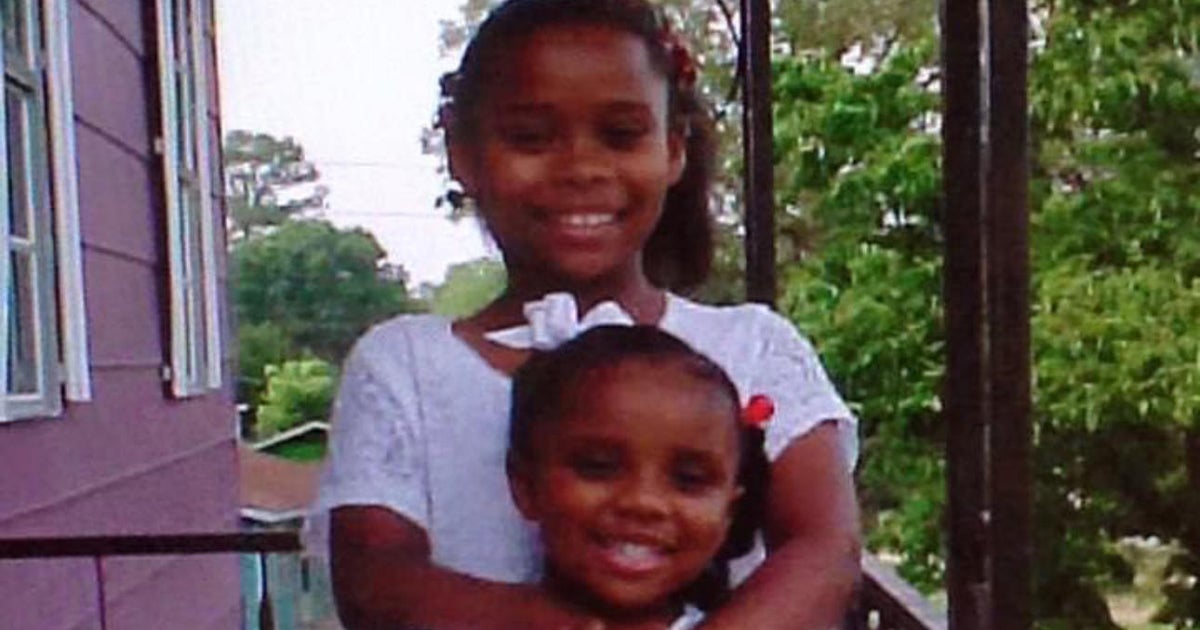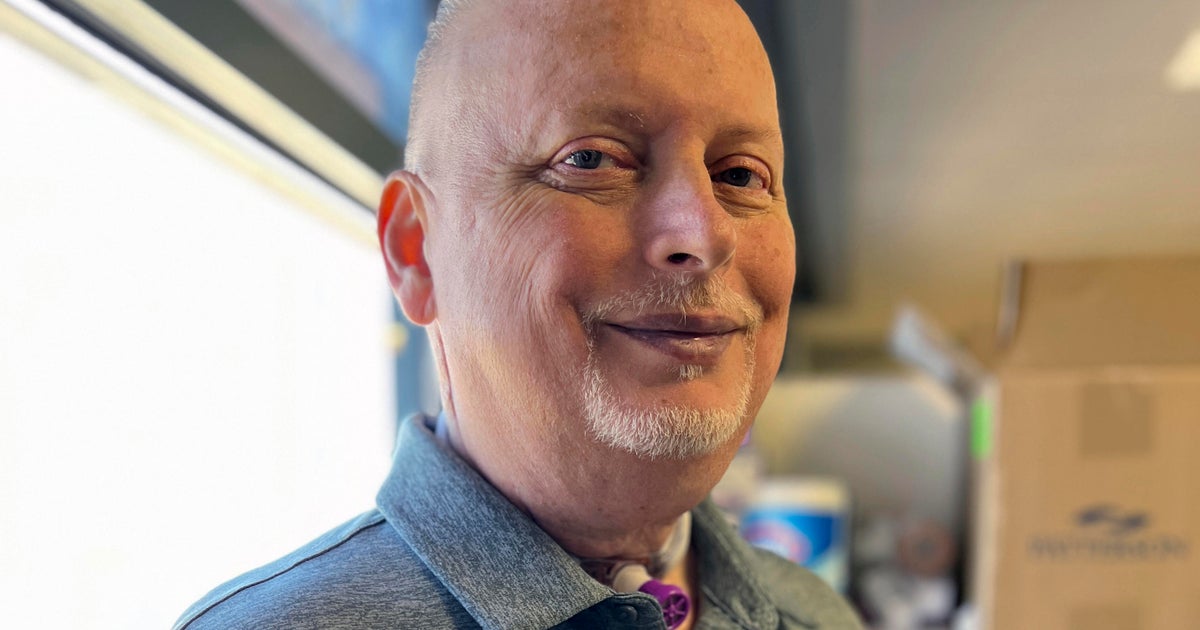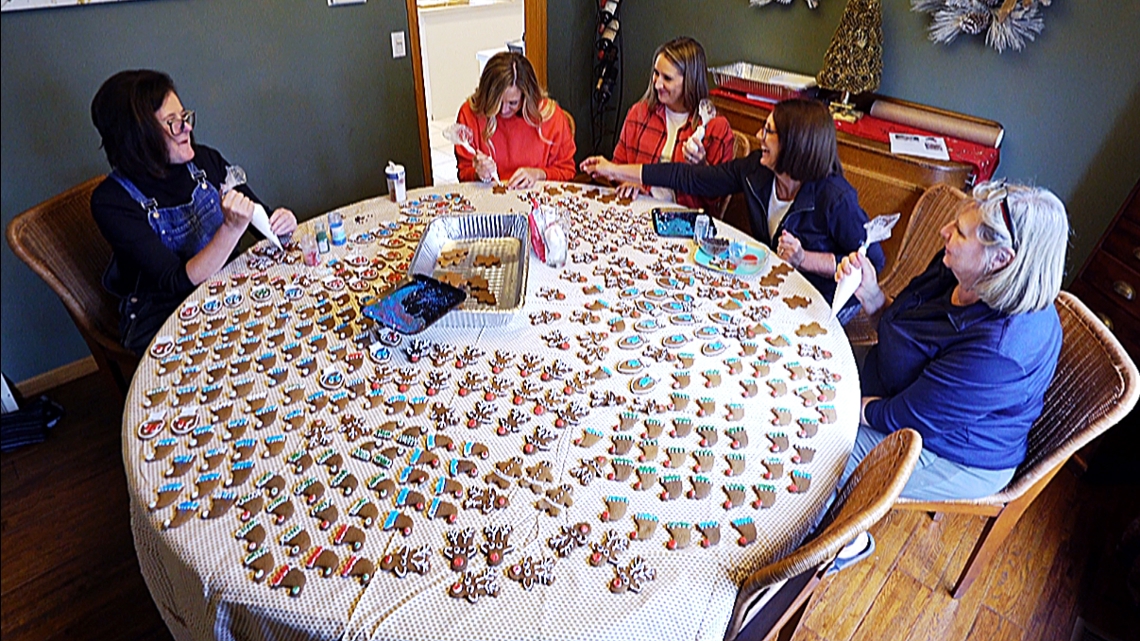CBS News
Meet some of the world’s cleanest pigs, raised to grow kidneys and hearts for humans

Wide-eyed piglets rushing to check out the visitors to their unusual barn just might represent the future of organ transplantation – and there’s no rolling around in the mud here.
The first gene-edited pig organs ever transplanted into people came from animals born on this special research farm in the Blue Ridge mountains – behind locked gates, where entry requires washing down your vehicle, swapping your clothes for medical scrubs and stepping into tubs of disinfectant to clean your boots between each air-conditioned barn.
“These are precious animals,” said David Ayares of Revivicor Inc., who spent decades learning to clone pigs with just the right genetic changes to allow those first audacious experiments.
The biosecurity gets even tighter just a few miles away in Christiansburg, Virginia, where a new herd is being raised – pigs expected to supply organs for formal studies of animal-to-human transplantation as soon as next year.
Shelby Lum / AP
This massive first-of-its-kind building bears no resemblance to a farm. It’s more like a pharmaceutical plant. And part of it is closed to all but certain carefully chosen employees who take a timed shower, don company-provided clothes and shoes, and then enter an enclave where piglets are growing up.
Behind that protective barrier are some of the world’s cleanest pigs. They breathe air and drink water that’s better filtered against contaminants than what’s required for people. Even their feed gets disinfected – all to prevent them from picking up any possible infections that might ultimately harm a transplant recipient.
Shelby Lum / AP
“We designed this facility to protect the pigs against contamination from the environment and from people,” said Matthew VonEsch of United Therapeutics, Revivicor’s parent company. “Every person that enters this building is a possible pathogen risk.”
The Associated Press got a peek at what it takes to clone and raise designer pigs for their organs – including a $75 million “designated pathogen-free facility” built to meet Food and Drug Administration safety standards for xenotransplantation.
Creating pigs to ease the shortage of human organs
Thousands of Americans each year die waiting for a transplant, and many experts acknowledge there never will be enough human donors to meet the need.
Animals offer the tantalizing promise of a ready-made supply. After decades of failed attempts, companies including Revivicor, eGenesis and Makana Therapeutics are engineering pigs to be more humanlike.
So far in the U.S., there have been four “compassionate use” transplants, last-ditch experiments into dying patients — two hearts and two kidneys. Revivicor provided both hearts and one of the kidneys. While the four patients died within a few months, they offered valuable lessons for researchers ready to try again in people who aren’t quite as sick.
Now the FDA is evaluating promising results from experiments in donated human bodies and awaiting results of additional studies of pig organs in baboons before deciding next steps.
Shelby Lum / AP
They’re semi-custom organs — “we’re growing these pigs to the size of the recipient,” Ayares noted — that won’t show the wear-and-tear of aging or chronic disease like most organs donated by people.
Transplant surgeons who’ve retrieved organs on Revivicor’s farm “go, ‘Oh my god that’s the most beautiful kidney I’ve ever seen,'” Ayares added. “Same thing when they get the heart, a pink healthy happy heart from a young animal.”
Shelby Lum / AP
The main challenges: how to avoid rejection and whether the animals might carry some unknown infection risk.
The process starts with modifying genes in pig skin cells in a lab. Revivicor initially deleted a gene that produces a sugar named alpha-gal, which triggers immediate destruction from the human immune system. Next came three-gene “knockouts,” to remove other immune-triggering red flags. Now the company is focusing on 10 gene edits — deleted pig genes and added human ones that together lessen the risk of rejection and blood clots plus limit organ size.
They clone pigs with those alterations, similar to how Dolly the sheep was created.
Twice a week, slaughterhouses ship Revivicor hundreds of eggs retrieved from sow ovaries. Working in the dark with the light-sensitive eggs, scientists peer through a microscope while suctioning out the maternal DNA. Then they slip in the genetic modifications.
“Tuck it in nice and smooth,” murmurs senior researcher Lori Sorrells, pushing to just the right spot without rupturing the egg. Mild electric shocks fuse in the new DNA and activate embryo growth.
Ayares, a molecular geneticist who heads Revivicor and helped create the world’s first cloned pigs in 2000, says the technique is “like playing two video games at the same time,” holding the egg in place with one hand and manipulating it with the other. The company’s first modified pig, the GalSafe single gene knockout, now is bred instead of cloned. If xenotransplantation eventually works, other pigs with the desired gene combinations would be, too.
Shelby Lum / AP
Hours later, embryos are carried to the research farm in a handheld incubator and implanted into waiting sows.
Luxury accommodations for important pigs
On the research farm, Tom Petty’s “Free Fallin'” was serenading a piglet barn, where music acclimates the youngsters to human voices. In air-conditioned pens, the animals grunted excited greetings until it’s obvious their visitors brought no treats. The 3-week-olds darted back to the security of mom. Next door, older siblings laid down for a nap or checked out balls and other toys.
“It is luxury for a pig,” Ayares said. “But these are very valuable animals. They’re very smart animals. I’ve watched piglets play with balls together like soccer.”
About 300 pigs of different ages live on this farm, nestled in rolling hills, its exact location undisclosed for security reasons. Tags on their ears identify their genetics.
Shelby Lum / AP
“There are certain ones I say hi to,” said Suyapa Ball, Revivicor’s head of porcine technology and farm operations, as she rubbed one pig’s back. “You have to give them a good life. They’re giving their lives for us.”
A subset of pigs used for the most critical experiments – those early attempts with people and the FDA-required baboon studies – are housed in more restricted, even cleaner barns.
But in neighboring Christiansburg is the clearest signal that xenotransplantation is entering a new phase — the sheer size of United Therapeutics’ new pathogen-free facility. Inside the 77,000-square-foot building, the company expects to produce about 125 pig organs a year, likely enough to supply clinical trials.
Company video shows piglets running around behind the protective barrier, chewing on toys and nosing balls back and forth.
They were born in sort of a porcine birthing center connected to the facility, weaned a day or two later and moved into their super-clean pens to be hand-raised. In addition to the on-site shower, their caretakers must put on a new protective suit and mask before entering each suite of pig pens — another precaution against germs.
The pig zone is surrounded on all sides by security and mechanical systems that shield the animals. Outside air enters through multiple filtration systems. Giant vats hold backup supplies of drinking water. Standing over the pig rooms, VonEsch showed how pipes and vents were placed to allow maintenance and repair without any animal contact.
It will take years of clinical trials to prove whether xenotransplantation really could work. But if it succeeds, United Therapeutics’ plan is for even larger facilities, capable of producing up to 2,000 organs a year, in several places around the country.
The field is at a point where multiple kinds of studies “are telling us that there’s no train wrecks, that there’s no immediate rejection,” Ayares said. “The next two or three years are going to be super exciting.”
CBS News
Trump taps Herschel Walker for ambassador to the Bahamas

President-elect Donald Trump announced he will nominate Herschel Walker, the former football player whose 2022 Senate run was plagued by controversy, to serve as U.S. ambassador to the Bahamas.
“Herschel has spent decades serving as an Ambassador to our Nation’s youth, our men and women in the Military, and athletes at home and abroad,” Trump said on social media Tuesday night.
Walker would need to be confirmed by the Senate to assume the role. The Senate has not confirmed a U.S. ambassador to the Bahamas in over a decade. Former President Barack Obama had nominated Cassandra Butts for the role in 2014, but the Senate never even brought her nomination up for a vote, according to The Associated Press. She died in 2016.
Trump in his first term nominated Doug Manchester in 2017 for the ambassador role, but his nomination stalled for over two years. CBS News in 2019 also uncovered evidence of a possible pay-to-play scheme for the role. He eventually withdrew and Trump went on to nominate William Douglass in 2020. Douglass’ nomination was withdrawn by President Biden when he took office, and Mr. Biden in turn nominated Calvin Smyre, who has not been confirmed by the Senate.
Absent an official ambassador to the Bahamas, Kimberly Furnish currently serves in the role of Chargé d’Affaires.
Walker rose to national prominence as a star running back for the Georgia Bulldogs, winning the Heisman trophy in 1982. He spent his first few years of professional ball in the United States Football League before it folded, and then moved on to the NFL.
Walker reentered the national spotlight when, at Trump’s urging, he challenged Georgia’s Democratic Senator Raphael Warnock for his seat in 2022. The race featured several controversies, including two women claiming that Walker — who was running as an anti-abortion candidate — had paid for them to get abortions.
Walker denied both allegations.
In one instance, Walker admitted to writing a check for a woman who said he paid for her to get an abortion in 2009, but he said he hadn’t known what the money was for.
Another woman claimed Walker paid her to get an abortion while the two carried out a six-year relationship while he was married to another woman and playing in the NFL. During a news conference back in 2022, she said she couldn’t go through with the procedure when she went to get it herself, so Walker took her to a clinic in the Dallas area the next day and waited for her while she got the abortion.
“This was a lie a week ago and it is a lie today,” Walker said at the time following an interview the woman gave a week after the initial news conference.
Warnock would go on to win the election in a runoff after neither candidate received more than 50% of the vote on election day.
Aaron Navarro and
contributed to this report.
CBS News
1 killed, 9 injured in mass shooting in Baltimore suburb of Towson, police say

BALTIMORE — One person was killed and nine others injured in a mass shooting in the Baltimore suburb of Towson Tuesday night, authorities said.
Law enforcement responded at around 7:15 p.m. in the 8500 block of Loch Raven Boulevard, Baltimore County Police Chief Robert McCullough said in a news briefing.
“It appears to be a mass shooting incident,” Baltimore County Police Chief Robert McCullough told reporters. “We have multiple persons who were shot. Right now, we are determining the circumstances and the conditions in this case.”
The first arriving officer found a vehicle on its side in flames, McCullough said, and then several gunshot victims were found in the area. The name of the person killed was not released, and the conditions of the nine people injured was unknown.
At this time, investigators believe this was an isolated and targeted incident, with no further threat to community at this point, he added. It’s unclear if any suspects have been arrested.
The Bureau of Alcohol, Tobacco, Firearms and Explosives is at the scene assisting police, as was the Baltimore County Fire Department.
Anyone with information is asked to call Baltimore County Police at 410-887-4636.
This is a developing story and will be updated.
CBS News
Can Democrats recapture the House in 2026?

Watch CBS News
Be the first to know
Get browser notifications for breaking news, live events, and exclusive reporting.














